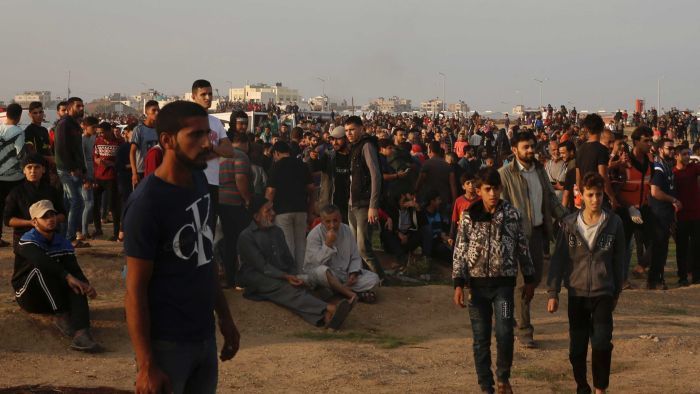Israeli forces killed seven Palestinians in the Gaza Strip in a clandestine raid targeting a Hamas commander and air attacks that provided cover for the commandos to escape back into Israel by car.
The Israeli incursion and air attacks drew rocket fire from the Hamas-controlled enclave late on Sunday. A senior official of Hamas, the group administering the Gaza Strip, said the Israeli special forces team infiltrated an area near the southern city of Khan Younis in a civilian vehicle.
Among those reported killed in the attack was Nour Baraka, a prominent commander of the al-Qassam Brigades, the armed wing of Hamas.
A ground operation inside the Gaza Strip is rare and it is likely to up tensions significantly.
“We heard that a special Israeli unit went inside Khan Younis and assassinated Nour Baraka and another [commander],” Ghazi Hamad, senior Hamas official, told Al Jazeera.
“After [that], the car which carried this special unit or some collaborators, they tried to escape … but they were followed by Hamas and the al-Qassam Brigades and after that Israel tried to cover this car through striking here in Gaza,” he added.
“I expect this night in Gaza to not be easy, to not be calm.”
Witnesses said during the chase Israeli aircraft fired more than 40 missiles in the area where the incident took place, killing at least four other people.
Fawzi Barhoum, a spokesman for Hamas, denounced what he called a “cowardly Israeli attack”.
Exchange of fire
An Israeli soldier was killed in an exchange of fire during the operation, the army said, as tensions rose with the Hamas-run Palestinian enclave.
“During an [Israeli] special forces operational activity in the Gaza Strip, an exchange of fire evolved,” the army said in a statement.
“At this incident, an IDF officer was killed and an additional officer was moderately injured,” it added, referring to the Israeli army.
The army said its soldiers had returned.
After the clash erupted, sirens were reported in southern Israel indicating rocket fire from the Gaza Strip.
Ten launches from Gaza towards Israel were identified and two were intercepted by Israeli missile defences, the army said. It was not immediately clear where the others landed.
Prime Minister Benjamin Netanyahu, on an official visit to France, announced he was rushing back to Israel to deal with the crisis.
A return by Israel to a policy of targeting individual Hamas commanders – tactics largely abandoned in recent years – could significantly raise tensions along the border.
Israel and Palestinian fighters in Gaza have fought three wars since 2008, and recent months of unrest have raised fears of a fourth.
Crippling blockade
Violence has flared frequently on the frontier since Palestinians began weekly protests on March 30.
Palestinians in the Gaza Strip have demonstrated along the fence with Israel demanding their right to return to the homes and land their families were expelled from 70 years ago.
They are also demanding an end to Israel’s crippling blockade of the Gaza Strip, which has gutted the coastal enclave’s economy and deprived its two million inhabitants of many basic commodities.
Since the Great March of Return demonstrations began on March 30, more than 200 Palestinians have been killed and thousands more wounded by Israeli troops deployed along the other side of the fence.
Egypt, Qatar and the United Nations have been trying to broker a long-term ceasefire.
Mouin Rabbani, a senior fellow at the Institute for Palestine Studies, told Al Jazeera it is clear Sunday’s covert operation was “a premeditated assassination”.
“The question that arises is what Israel’s motivations were? Were they, as so often in the past, trying to give Hamas a bloody nose just to remind them that they’re in charge and that they will decide the terms of which any ceasefire is reached?
“Are they perhaps by contrast trying to scuttle this ceasefire initiative and perhaps engage in a larger conflict as happened in 2008, 2009, 2012 and 2014?” Rabbani said.
“My sense is that Israel at this stage is probably more interested in giving Hamas a bloody nose and trying to remind people who is boss and it will be Israel that decides the extent to which the illegal blockade of the Gaza Strip is maintained.”
Qatari cash
On Friday, Palestinian civil servants began receiving payments after months of sporadic salary disbursements in cash-strapped Gaza, with $15m delivered into the enclave through Israel in suitcases by Qatar.
Hamas responded by lowering the intensity of Friday’s border protest.
Life under siege – Nafez Adayess: ‘People want to go back to their land’
A total of $90m will be distributed in six monthly instalments, Gaza authorities said, primarily to cover salaries of officials working for Hamas.
Qatar has also said it would hand out $100 to each of 50,000 poor families, as well as larger sums to Palestinians wounded in clashes along the Gaza-Israel border.
The Gulf emirate has also started buying additional fuel for Gaza’s sole power station, allowing outages to be reduced to their lowest level in years.
The payments are part of what is expected to be a set of informal understandings between Israel and Hamas.
Netanyahu earlier on Sunday defended his decision to allow Qatar to transfer the cash to Gaza despite criticism from within his own government over the move, saying he wanted to avoid a war if it wasn’t necessary.
In the occupied West Bank, Palestinian President Mahmoud Abbas angrily accused Israel and the United States of ganging up behind his back to entrench Hamas’ control over Gaza.
He also accused Hamas of undermining his goal of establishing an independent Palestinian state that includes all of the occupied West Bank and the Gaza Strip.
[Source: Al Jazeera]





 WhatsApp us
WhatsApp us 

